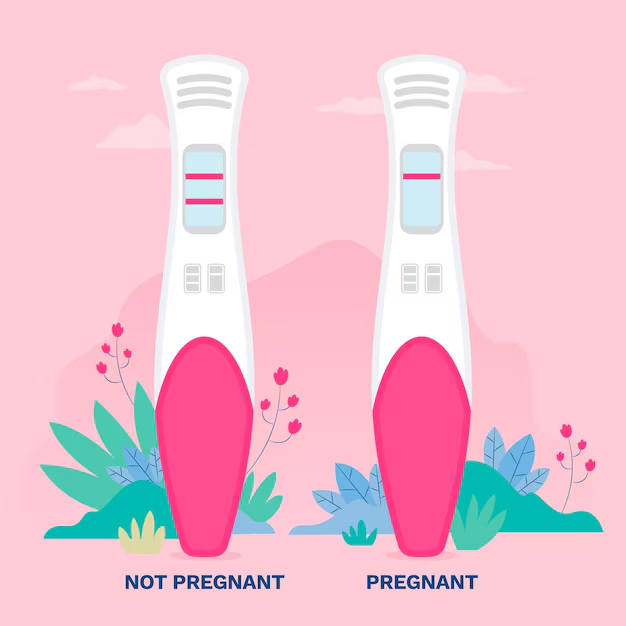Understanding Pregnancy Tests: How They Work

Pregnancy tests are a common and vital tool for anyone who suspects they may be pregnant. Whether you’re trying to conceive or experiencing symptoms that could indicate pregnancy, understanding how pregnancy tests work can help alleviate some of the anxiety and uncertainty. In this blog, we’ll break down the types of pregnancy tests available, how they work, and what to expect when taking them.
1. What Is a Pregnancy Test?
A pregnancy test is a medical test used to determine whether a woman is pregnant. These tests detect the presence of human chorionic gonadotropin (hCG), a hormone that the body begins to produce after a fertilized egg implants in the uterus. Since hCG is produced specifically during pregnancy, its presence in the body is an indicator that pregnancy has occurred.
Pregnancy tests can be done at home using over-the-counter kits or at a healthcare facility through a blood test.
2. How Do Home Pregnancy Tests Work?
Most home pregnancy tests are urine-based tests that you can take in the privacy of your home. They come with easy-to-follow instructions and usually include a test strip or stick. Here’s how they work:
- Detecting hCG in Urine: When a fertilized egg implants in the uterus, it starts producing hCG. This hormone is found in a woman's urine shortly after implantation. Home pregnancy tests work by detecting the presence of hCG in the urine.
- Test Application: For a urine test, you will either urinate directly onto a test strip or dip a test strip into a urine sample. The test will typically show results in a few minutes.
- Result Interpretation: Most tests show either two lines (positive) or one line (negative). Some tests may display the results as a plus (+) or minus (-), or with words like "pregnant" or "not pregnant." Always read the results within the time frame specified in the instructions.
3. When to Take a Home Pregnancy Test?
Timing is key when it comes to taking a pregnancy test. For the most accurate results:
- Wait until after your missed period: Taking a pregnancy test too early can lead to false negatives because the hCG levels may not be high enough to be detected yet. It's generally recommended to wait until after your missed period to ensure the most accurate result.
- Morning Urine: hCG is most concentrated in the first urine of the day, so it's best to take the test in the morning for more accurate results.
If you test too early and get a negative result but still suspect pregnancy, wait a few days and take another test.
4. Types of Pregnancy Tests
There are two main types of pregnancy tests: urine tests and blood tests.
Urine Pregnancy Tests (Home Tests)
- At-Home Tests: These are the most common and are available over-the-counter at pharmacies. They are affordable, easy to use, and can give results in just a few minutes. They work by detecting the presence of hCG in urine and can be used in the comfort of your own home.
- Clinic Tests: Some clinics or doctor's offices offer urine tests that work similarly to home tests. However, they may provide more support and counseling during the testing process.
Blood Pregnancy Tests
Blood tests are more sensitive than urine tests and can detect pregnancy earlier. There are two types of blood tests:
- Qualitative hCG Test: This test checks for the presence or absence of hCG. It provides a simple "yes" or "no" answer regarding pregnancy.
- Quantitative hCG Test (Beta hCG Test): This test measures the exact amount of hCG in the blood and can help determine how far along the pregnancy is. It is more commonly used by healthcare providers when early pregnancy complications are suspected.
Blood tests are typically performed in a healthcare setting and may take longer to get results compared to home tests.
5. Accuracy of Pregnancy Tests
While pregnancy tests are generally very accurate, no test is perfect. The accuracy of the test depends on several factors:
- Timing: Testing too early may lead to a false negative. Always follow the instructions and wait until your missed period for the best chance of an accurate result.
- Test Sensitivity: Some tests are more sensitive than others and can detect lower levels of hCG. These tests can provide results earlier, but they may also be more prone to false positives if you take the test too early.
- Proper Use: Follow the instructions carefully for the best results. Taking the test at the wrong time or using it improperly can lead to inaccurate results.
6. What Do You Do After the Test?
Once you’ve taken a pregnancy test and received your result, there are a few steps to follow:
- If the Test is Positive: If the test is positive, it’s time to schedule an appointment with your healthcare provider to confirm the pregnancy through a blood test and discuss next steps. Your provider may suggest further tests or an ultrasound to determine how far along you are.
- If the Test is Negative: If you get a negative result but still suspect you’re pregnant, wait a few days and retest. If your period doesn’t come or your symptoms persist, consider visiting your doctor for further testing.
7. Factors That Can Affect Pregnancy Test Results
Several factors can impact the accuracy of a pregnancy test:
- Medication: Certain medications, especially those containing hCG, can interfere with test results.
- Diluted Urine: If you drink a lot of fluids before taking the test, your urine may be diluted, which could lower the concentration of hCG and lead to a false negative result.
- Expired Tests: Always check the expiration date on pregnancy tests. Using an expired test can lead to inaccurate results.
8. Common Myths About Pregnancy Tests
There are many misconceptions surrounding pregnancy tests, so it’s important to separate fact from fiction. Here are a few common myths:
-
Myth: The more lines on the test, the further along you are in your pregnancy.
- Fact: Pregnancy tests simply indicate whether hCG is present. The number of lines or symbols does not provide any information about how far along the pregnancy is.
-
Myth: Taking a test immediately after a missed period will always give a clear result.
- Fact: It’s possible to test too early. Some women may not have enough hCG in their urine to produce a positive result immediately after a missed period.
-
Myth: If the test result is faint, it means you're not pregnant.
- Fact: A faint line is still a positive result. The intensity of the line depends on the concentration of hCG in your urine, which can vary.
Related Articles

Social and Relationship Care: Tips for Building Strong Connections

Common Health Complications During Pregnancy: What You Need to Know

Fertility and Conception: A Comprehensive Guide to Getting Pregnant

The Role of Menstrual Blood in Traditional Medicine

Baby development at 25 weeks

Baby development at 14 weeks

Baby development at 15 weeks

Baby development at 37 weeks